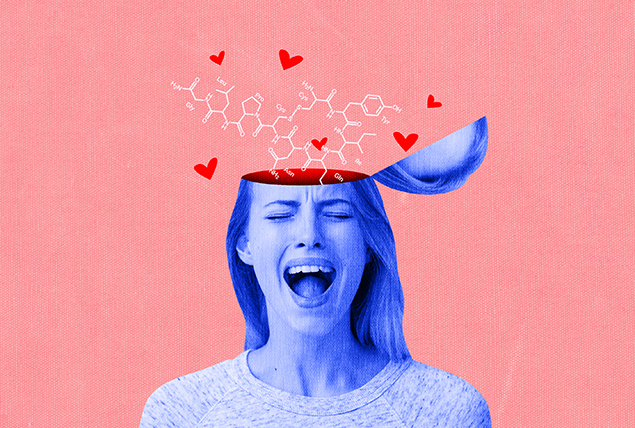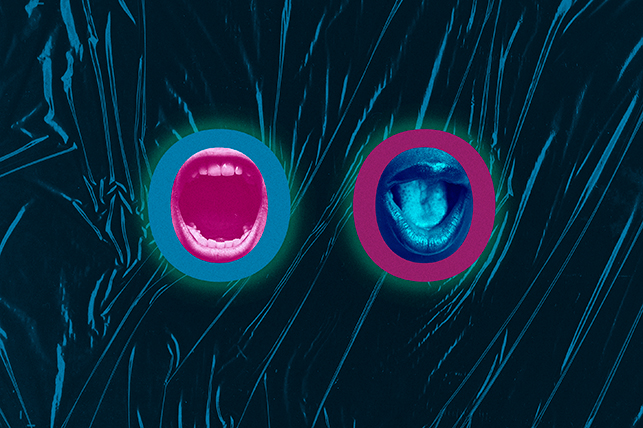Check Out the Sexual Benefits of Oxytocin

There's a reason oxytocin is commonly referred to as the "love hormone."
It can significantly impact how you feel toward yourself and others, according to Susan Milstein, Ph.D., a master certified health education specialist and the founder of Milstein Health Consulting in Gaithersburg, Maryland.
While this feel-good hormone is well known for its pivotal role in childbirth, breastfeeding and bonding with infants, it can have sexual benefits, too.
Research suggests oxytocin has earned its endearing nickname.
Sexual benefits of oxytocin
This hormone, which everyone is born with the ability to produce, can help us feel more connected to other people. In just about every component of sex, from foreplay to orgasm, oxytocin plays at least a partial role.
"When we're sexually stimulated or aroused, our body produces oxytocin," Milstein explained.
The hypothalamus produces oxytocin, and the pituitary gland releases it into the bloodstream. The pituitary gland governs several essential functions, such as growth, metabolism and reproduction.
During intimate activity, the release of the hormone is dependent on the stimulation of sensory nerves. Activities such as stroking, low-intensity stimulation of the skin and massage can all cause a release of oxytocin.
Oxytocin has a wide variety of benefits that can impact sexuality. From stress reduction to social bonding and affection, the hormone plays a significant role in the vast terrain of sexual pleasure and what makes humans bond with one another.
During intimacy, the hormone's purpose can best be described as producing deep emotional attachments or creating warm and calming effects that alleviate stress, which could account for the happiness some people typically feel after sex.
Oxytocin can be produced solo
If oxytocin is the love drug, does the pituitary gland release it even if there's no love interest?
Contrary to popular belief, you don't need a partner to release oxytocin, Milstein explained. While partnered sex is one way to release the hormone, masturbation is also effective.
"Close human contact can release it, also, whether that's a massage or a good hug," she said.
Its release isn't dependent on specific sexual activities, either, or whether someone reaches orgasm, though this is undoubtedly a time when oxytocin can be released.
Sometimes human interaction isn't always accessible, which was a challenge for many people during COVID-19 lockdowns and social distancing, Milstein noted.
"That doesn't mean that you can't get an oxytocin release," she said. "Spending time with people you care about, even if there's no contact, can cause an oxytocin release."
There's an evolutionary case for the hormone, too: Bonding with one another is necessary for survival.
Milstein said activities such as exercise or even hugging a pet are a couple of not-so-obvious ways oxytocin can be released. Some research also suggests sharing food, eating or doing yoga can facilitate oxytocin release.
Oxytocin, arousal and orgasm
Before sex, oxytocin can be released due to sensitive factors. Simple gestures such as hugging, light touching or gazing into someone's eyes can cause oxytocin release.
Oxytocin has benefits for everyone. At least one study shows that oxytocin enhances female orgasm and contentment after orgasm. Oxytocin also plays a role in erections and stimulation of the reproductive tract.
"When we're sexually active, whether that's by ourselves or with a partner, our bodies release oxytocin, and this is true regardless of your sex assigned at birth," Milstein said.
Oxytocin also may play a role in orgasm dysfunction. One recent small-scale study examined oxytocin levels in women whose orgasms are sparse, delayed or nonexistent versus women who regularly achieved orgasm. Those who reported regular sexual satisfaction in the study had higher levels of oxytocin, while those who had stressful or unsatisfactory experiences had lower levels of the hormone.
For some people, the release of oxytocin during sex depends on their connection to a partner.
"If you're not feeling connected to a partner, no matter how much sex you may be having with them, there might not be a release of oxytocin," Milstein explained. "For some people, especially those who are being coerced into sex, there will probably not be a release of oxytocin."
Oxytocin and trust
Oxytocin's ability to heighten social attachment plays a significant role in why it's called the love hormone, and even "liquid trust" by some people.
One study found oxytocin makes people more trusting, and another suggested that activities as innocuous as receiving a massage made people more trusting. The same study found oxytocin influenced people's impression of others. This could lend some scientific reasoning to clichés about love such as being "swept off your feet" or "clouded by love," when you actually may be experiencing the chemical effect of the hormone.
Oxytocin levels are significantly elevated early in relationships, and oxytocin can improve recognition of other people's emotions, further deepening the connection.
Essentially, the hormone can work as a bonding agent around sex, which helps explain why people might feel more connected to a partner afterward.
The key to boosting oxytocin levels during sex is to not think about it, Milstein said.
"Our bodies release oxytocin when we're enjoying ourselves and feeling connected," she explained. "Stop worrying about if, when, how much oxytocin is going to be released and instead just try to stay in the moment and enjoy yourself."
Synthetic oxytocin, most commonly prescribed as a nasal spray, is in the early stages of research for its effects on conditions such as addiction and mental health disorders. In terms of sexual function, synthetic oxytocin is not well researched, but at least one study showed promising results for its use to combat sexual dysfunction and low libido.
Oxytocin's role in childbirth and lactation has been more densely researched than its impacts on sexual behavior and pleasure. Still, substantial studies point to its impressive existence in all stages of sex, ranging from connection to function.
Simply stated, there is more than one reason people experience the love hormone. Not only can it make sex more enjoyable, it can also bring you and your partner closer together.


















